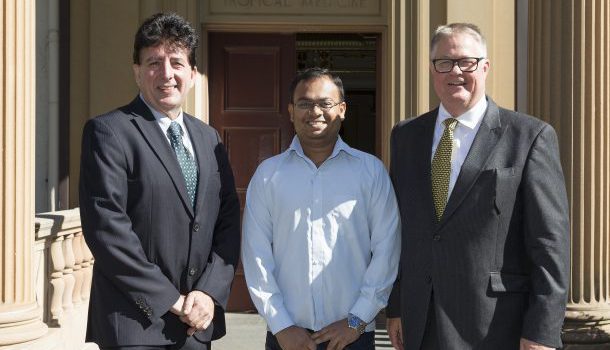
Novel solutions for biofilm infections are the focus of a new research agreement between the University of Sydney, Whiteley Corporation and the Innovative Manufacturing Cooperative Research Centre, with $3.5 million to be co-invested in the project over four years.
The research will be led by Dr Trevor Glasbey and Dr Greg Whiteley from Whiteley Corporation, and Dr Jim Manos and Dr Theerthankar Das from the Central Clinical School’s Discipline of Infectious Diseases and Immunology in the University’s multidisciplinary Charles Perkins Centre.

Announcing the grant and the research agreement, Dr Whiteley said the work would be of major medical significance worldwide.
“Bacterial biofilms cause both human disease and death, and these microbes are also responsible for contamination in industrial and institutional settings,” Whiteley said.
“This manufacturing research project aims to commercialise a series of combination therapies being developed in collaboration with the University of Sydney, arising from early findings by Dr Manos and his team.”
Biofilms formed by bacteria on living tissue cause morbidity and mortality in humans and animals. They also form on inanimate medical-related surfaces such as catheters, implants, medical instruments and almost all dry surfaces, where they pose a significant infection risk for patients.
“This project will demonstrate how combination therapy can be used to effectively disrupt the formation of biofilm and eradicate underlying bacteria found in the lungs of cystic fibrosis patients, chronic urinary tract infections, diabetic leg wounds, burn wounds, dry and wet surfaces, the food industry and industrial oil, gas and water pipes,” said Dr Manos.
“We will bring products to market through the development and application of innovative manufacturing technologies that improve biofilm removal – both in areas of medical importance to improve the lives of people worldwide, and in industry to achieve less waste in food production and savings in the cost of transported liquids.”
IMCRC CEO and managing director, David Chuter said incorporating advanced manufacturing technologies and processes into the project will be crucial to successfully commercialise the new formulated products.
“The Whiteley Corporation has collaborated with universities around the world and as a local manufacturer, we are leading the way in world class research,” Dr Whiteley added.